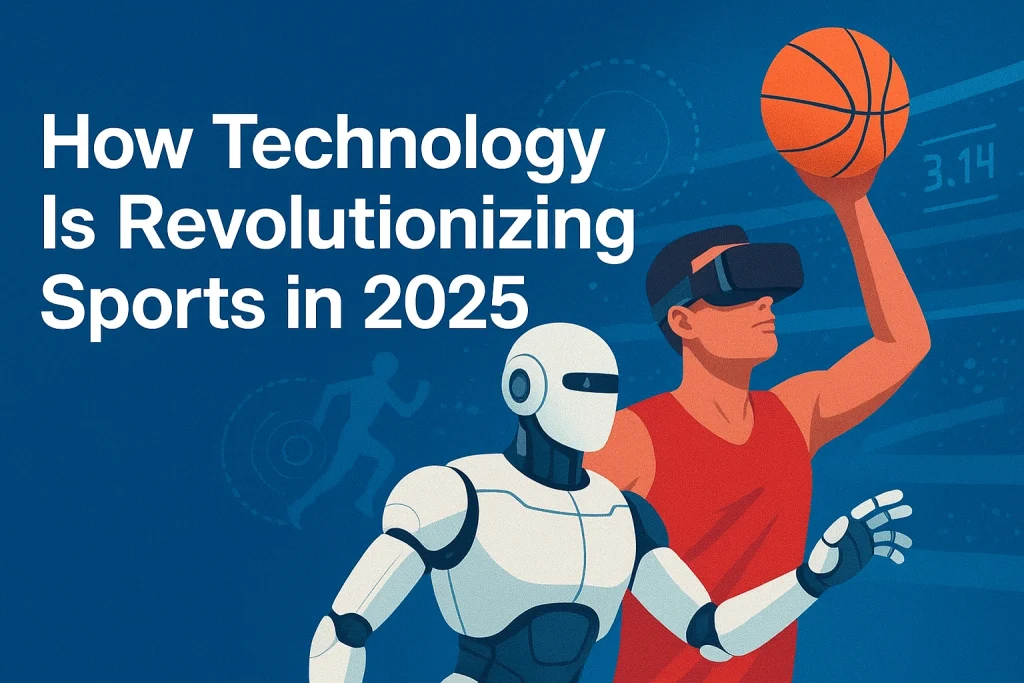How Technology Is Revolutionizing Sports in 2025: The Future of Play, Performance & Fan Experience
Sports are no longer just about physical strength, skill, and strategy. In 2025, technology has become one of the biggest drivers of change in the global sports industry. From AI-powered training to robot sports competitions, the future of athletics is more exciting, immersive, and data-driven than ever before.
This article explores the top sports technology trends of 2025, why they matter, and how they’re transforming both athletes and fans. Whether you’re a casual sports lover or a tech enthusiast, this deep dive will show you how innovation is redefining the game.

AI is making progress day by day; we can use its features to create the best visual content. Download REMINI MOD APK to enhance your social content.
QUICK TAKE
Sports in 2025 are changing fast — thanks to AI, VR, robotics, and smart stadiums. Athletes train smarter, fans watch games in new immersive ways, and even robot sports competitions are becoming a global trend.
AI tools now analyze performance, prevent injuries, and create personalized training plans. VR and AR let fans enjoy courtside views from home with real-time stats and interactive replays. Stadiums are becoming smart, eco-friendly, and fully digital — offering seamless fan experiences.
One of 2025’s most viral topics is the rise of Humanoid Robot Sports Games, where advanced robots compete in sprinting, agility tests, and team events. This futuristic concept is grabbing massive global attention.
Whether you love sports or tech, 2025 marks the beginning of a new era: smarter, faster, more immersive, and powered by innovation.
AI & Data Analytics: Smarter Athletes, Smarter Teams
Artificial Intelligence has become a game-changing force in professional and amateur sports. It’s not just a buzzword—it’s a core tool used for training, strategy, recruitment, and injury prevention.
How AI Is Changing Sports in 2025
Real-Time Performance Tracking
AI tools instantly analyze player movements, biometrics, fatigue levels, and tactical positioning.
Predictive Injury Prevention
Teams can now detect early signs of stress or overtraining before injuries occur.
Smart Scouting & Recruitment
Algorithms can evaluate thousands of players’ performance data and predict long-term potential better than traditional scouting.
AI Coaches & Virtual Mentors
Athletes can now receive personalized training plans based on their strengths, weaknesses, and recent performance.
Why It Matters:
AI levels the playing field by giving both elite and amateur athletes access to insights that used to require whole teams of analysts.
VR & AR: The Next Generation Fan Experience
2025 is the year when sports viewing becomes immersive. Virtual Reality (VR) and Augmented Reality (AR) are transforming how fans watch games, interact with athletes, and even train like professionals.
Top Innovations in VR/AR Sports Technology
VR Courtside Seats
Fans can sit “front row” at global matches from their homes.
AR Overlays During Live Matches
Live stats, shot speed, heat maps, and player comparisons appear in real-time.
Virtual Arenas & Fan Zones
Fans can cheer for teams, play mini-games, and interact with avatars of athletes.
AI-Powered Replay Enhancements
Match highlights can be viewed from any angle with hyper-realistic simulation.
Why It Matters:
It brings fans closer to the action, boosts engagement, and introduces a new generation to sports through immersive experiences.
Smart Stadiums: The Future of Live Sports
Stadiums worldwide are becoming intelligent digital ecosystems. Built using IoT sensors, automation, AI security, and eco-friendly designs, smart stadiums are redefining how we experience live events.
Key Features of Smart Stadiums in 2025
AI Crowd Management & Safety
Facial recognition, smart entry gates, and automated monitoring systems reduce wait times and enhance safety.
Energy-Efficient Infrastructure
Solar panels, smart lighting, and low-waste water systems promote sustainability.
AR Navigation
Fans can use their phones to locate seats, restrooms, or food counters.
Interactive Fan Apps
Instant replays, food ordering, trivia competitions, and loyalty rewards.
Why It Matters:
Smart stadiums make events more comfortable, secure, eco-friendly, and engaging — attracting larger crowds and boosting revenue.
Humanoid Robot Sports: The Most Trending Topic of 2025
One of the biggest sports news stories of 2025 is the announcement of the world’s first Humanoid Robot Sports Games, taking place in Beijing.
What Are Robot Sports?
These competitions feature fully functional humanoid robots competing in:
- Sprinting
- Strength tests
- Agility courses
- Team challenges
- Robotics-enhanced strategy games
Why People Are Excited?
It showcases the cutting edge of robotics and AI.
It attracts both sports fans and tech communities.
It signals a new era of human-machine competitions.
Will Robot Sports Become Mainstream?
Many experts predict robot sports could become as popular as eSports within a few years thanks to innovation, entertainment value, and global media attention.
Affordable Sports Tech for Amateurs
Technology isn’t just for professional teams anymore. 2025 introduces a wave of affordable performance tools that help everyday athletes train like pros.
Latest Tools Helping Amateur Athletes
AI video analysis apps
Measure speed, accuracy, and motion using just a smartphone.
Wearable trackers
Monitor heart rate, stamina, sleep, and recovery with more accuracy.
Form Correction AI
Apps that alert athletes when they perform movements incorrectly.
Mobile-Based Speed Tracking
Badminton, tennis, and soccer players can measure serve or shot speed without expensive equipment.
Why It Matters:
It democratizes high-level training and makes sports more accessible to everyone.
Gamification & Mental Performance Technology
Mental strength is now just as important as physical ability. Sports tech in 2025 includes powerful tools for mind training, reaction time improvement, and stress control.
Popular Innovations
- VR pressure simulations
- Athletes practice performing under high-pressure scenarios.
- Brain-training games
- Improve focus, reflexes, and decision-making.
- AI-based mental coaching
- Personalized guidance based on emotional and cognitive patterns.
Why It Matters:
Mental fitness boosts confidence, performance, and resilience during high-stakes situations.
Sustainability: The New Priority in Sports
With climate change a global concern, sports organizations are adopting green technology to reduce their carbon footprint.
Top Sustainability Trends
- Recycled & biodegradable sports gear
- Energy-efficient stadiums
- Eco-friendly turf and playing surfaces
- Digital tickets & paperless events
- Remote live experiences to reduce travel impact
Why It Matters:
The sports world is becoming more responsible, environmentally conscious, and future-focused.
Challenges & Ethical Questions
Even with rapid progress, new challenges have emerged:
- Data privacy concerns (biometrics + personal analytics)
- AI bias in performance prediction
- Regulation of robot competitions
- Cost accessibility for low-income athletes
As technology grows, sports authorities will need strong rules to ensure fairness, transparency, and safety.
Conclusion: A New Era of Sports Has Begun
2025 marks a turning point in the history of sports. Technology is no longer an optional add-on—it’s a core part of how athletes train, how fans engage, and how competitions are run. The rise of AI, robotics, VR, sustainability, and smart stadiums proves that the future of sports is faster, smarter, immersive, and more exciting than ever before.



